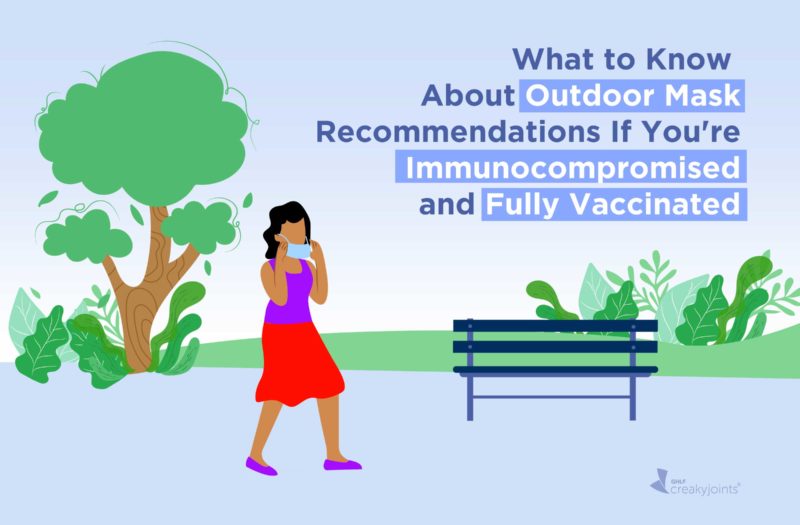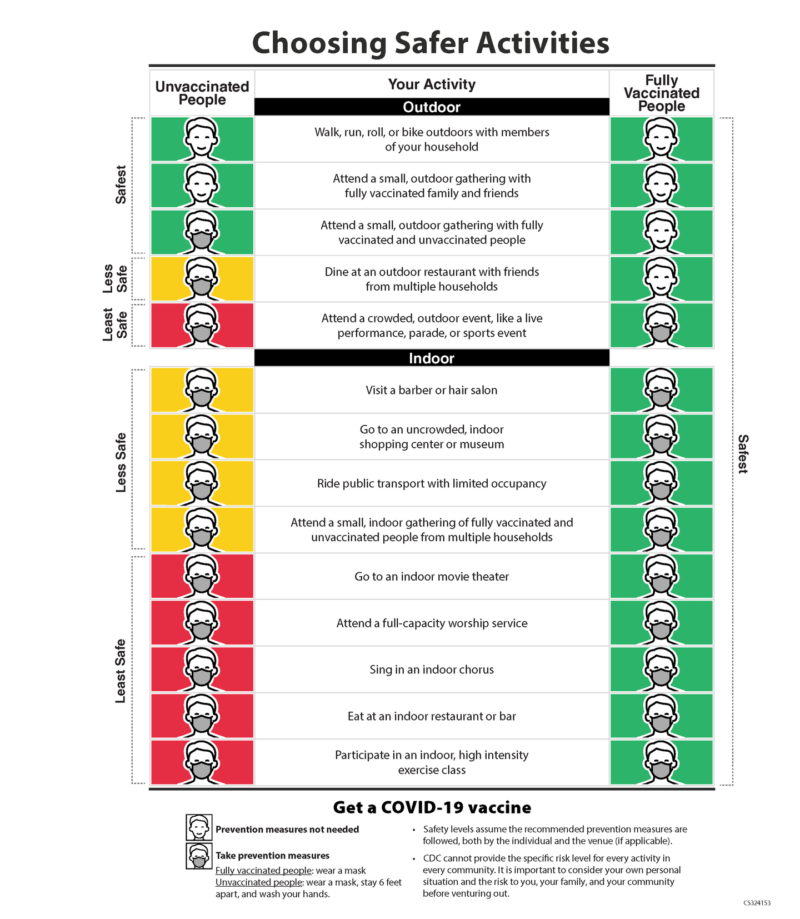Learn more about our FREE COVID-19 Patient Support Program for chronic illness patients and their loved ones.
The U.S. Centers for Disease Control and Prevention (CDC) recently released new guidance for when fully vaccinated Americans can opt out of wearing a mask outdoors — including when in small groups and when exercising. The CDC emphasizes, however, that these recommendations are not a blanket statement for immunocompromised people.
In fact, the updated guidance states: Immunocompromised people need to consult their health care provider about these recommendations, even if fully vaccinated. That’s because data is still limited on vaccine protection in immunocompromised people at this time.
Here’s what you need to know about the new outdoor mask recommendations, plus how to discuss them with your doctor if you’re immunocompromised.
What Do the CDC’s New Mask Recommendations Say?
The CDC’s recent recommendations give a little more leeway to Americans who are fully vaccinated, while still underscoring that immunocompromised people should talk to a doctor about their options.
According to the recent updates, fully vaccinated people no longer need to wear a mask outdoors, except in certain crowded settings and venues. That means fully vaccinated Americans no longer need to wear a mask outside while walking, running, hiking, or biking by themselves or when at small gatherings.
“One should note that the outdoor activities are recommended to be undertaken mostly with members of your own household, and ideally with other fully vaccinated individuals, or in small groups to minimize risk of COVID-19 exposure and possible post-vaccination infection,” says Jiha Lee, MD, a Clinical Assistant Professor specializing in rheumatology at Michigan Medicine.
Someone is considered fully vaccinated if it’s been two or more weeks since they received the second dose of the Pfizer or Moderna vaccine, or it’s been two or more weeks since they received the single-dose Johnson & Johnson vaccine.
Although it’s generally considered safe for fully vaccinated people to be outside without a mask, the CDC continues to recommend mask requirements for crowded outdoor settings and venues — think concerts or sports stadiums, where it’s more difficult to maintain physical distance — until widespread vaccination is achieved in the United States. The CDC still recommends masks for medium or large outdoor gatherings.
The guidance also say that fully vaccinated people should continue to:
- Take precautions in indoor public settings, like wearing a well-fitted mask
- Wear well-fitted masks when visiting indoors with unvaccinated people who are at increased risk for severe COVID-19 disease or who have an unvaccinated household member who is at increased risk for severe COVID-19 disease
- Wear well-fitted masks when visiting indoors with unvaccinated people from multiple households
- Avoid indoor large-sized in-person gatherings
- Get tested if experiencing COVID-19 symptoms
- Follow guidance issued by individual employers
- Follow CDC and health department travel requirements and recommendations
What Should Immunocompromised People Know?
As the guidance states, it’s important for immunocompromised people to speak with a doctor about mask use outdoors. Depending on the medications you take and your condition, your doctor will consider how much of an immune response you may have garnered from the vaccine and what mitigation efforts you should take as a result.
“Immunocompromised persons may still be at an increased risk of COVID-19 infection even after vaccination, and should continue measures of prevention including masking, social distancing, and regular hand hygiene,” says Dr. Lee.
Ongoing research is studying the effectiveness of the COVID-19 vaccine in immunocompromised people, but of course, immunosuppression can vary quite vastly depending on your condition and treatment.
“Immunocompromised is a very broad term — it can mean somebody who is on a little bit of the steroid prednisone, or somebody who has a bone marrow transplant or solid organ transplant and is on heavy-duty immunosuppressive medications,” says Aditya Shah, MD, an Infectious Disease Consultant at the Mayo Clinic.
“That’s why you need to make an individual decision based on your extent of immune suppression,” continues Dr. Shah. “Your doctor should be the best person to talk about it depending on your particular clinical situation, how many immunosuppressive medications you are on, how long you’ve been on those medications, what the nature of your immunocompromising condition is, what your individual risk with those factors is, and so on.”
This wide range of potential factors is why the CDC does not recommend a blanket statement for immunocompromised individuals. But researchers are actively studying the effects of the vaccine in this population, and more data should be available soon.
“We are making a tremendous amount of progress with the vaccine, and in the next couple months, I hope that we can relax these recommendations or make them more concrete for our community of immunocompromised patients,” says Dr. Shah.
It may be the case that you and your doctor decide it’s okay for you to not wear a mask outside in accordance with the CDC recommendations only when you’re with other fully vaccinated people, but you opt to be more cautious and wear mask when you’re with people who are not vaccinated or whose vaccination status you do not know.
What Additional Steps Can Immunocompromised People Take?
As has been the case throughout the pandemic, the CDC guidance underscores that being outdoors is safer than being indoors. It may be prudent to do as many activities as possible outdoors if you are immunocompromised to further protect yourself, even if you are fully vaccinated.
“Activities like working out are preferable to do outside, rather than inside, and I would recommend that,” says Dr. Shah. “If you’re doing activities indoors with other people around, make sure that the density of the people in that particular setting is less or most of them are vaccinated.”
For extra protection, especially when indoors, you may consider wearing a medical mask under a cloth mask, something the CDC has pointed out can reduce exposure to potentially infectious aerosols by up to 95 percent. Doubling up on masks prevents side gaps that may make them less effective.
“Well-fitting masks are important to reduce the risk of COVID-19,” says Dr. Lee. “Immunocompromised patients should consider double masking, especially with indoor activity and large gatherings that would place them in close proximity with other individuals whose vaccination status is unknown.”
Many people are eager to strip themselves of masks as soon as possible, but if you are immunocompromised and don’t mind wearing one, it may provide you with greater protection from a variety of illnesses in the long-term.
“A lot of immunocompromised patients can get really sick even from a simple virus like the influenza virus, and we do have a lot of evidence that masking reduces the rate of several infections,” says Dr. Shah. “So if someone is comfortable wearing a mask long-term, I don’t think that’s a bad idea. But if somebody is not comfortable wearing it, then they should continue to wear it at least until we get past this pandemic.”
Get Free Coronavirus Support for Chronic Illness Patients
Join the Global Healthy Living Foundation’s free COVID-19 Support Program for chronic illness patients and their families. We will be providing updated information, community support, and other resources tailored specifically to your health and safety. Join now.
Interim Public Health Recommendations for Fully Vaccinated People. COVID-19. U.S. Centers for Disease Control and Prevention. April 27, 2021. https://www.cdc.gov/coronavirus/2019-ncov/vaccines/fully-vaccinated-guidance.html.
Interview with Aditya Shah, MD, an Infectious Disease Consultant at the Mayo Clinic
Interview with Jiha Lee, MD, a Clinical Assistant Professor specializing in rheumatology at Michigan Medicine







